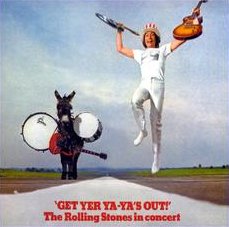History
The Rolling Stones 1969 American Tour's trek during November into December, with Terry Reid, B.B. King (replaced on some dates by Chuck Berry) and Ike and Tina Turner as supporting acts, played to venues with all tickets sold out. The tour was the first for guitarist Mick Taylor with the Stones, having replaced Brian Jones shortly before Jones's death in July; this was also the first album where Taylor appeared fully and prominently, having only played on two songs on Let It Bleed . [1] The performances captured for this release were recorded on 27 November 1969 (one show) and 28 November 1969 (two shows) at New York City's Madison Square Garden, except for "Love in Vain," recorded in Baltimore on 26 November 1969. Overdub sessions took place in January 1970 in London's Olympic Studios. The finished product featured overdubbed lead vocals on all tracks except "Love In Vain", "Midnight Rambler and Sympathy for the Devil," added back-up vocals on three tracks, and overdubbed guitar on ("Little Queenie", where Mick Taylor's rhythm guitar was replaced by Keith Richards. However, this album is widely recognized as one of few actual 'live' albums during this era.
The album's title is taken from "Get Your Yas Yas Out, a song recorded by Blind Boy Fuller in 1938. In the context of the Blind Boy Fuller song, the meaning of Ya-Ya's is interpreted to mean ‘to blow off steam’, ‘get the energy out’, to 'jump and dance' and for having sex, where Ya Ya's are women's breasts. This is the interpretation as shown on the cover of the album, with Charlie Watts jumping around with a guitar and bass in his hands, an 'ass' to the left of him, and himself wearing a T-shirt with a picture of women's breasts. [2] The photo by David Bailey was further inspired by a line in Bob Dylan's song "Visions of Johanna": "Jewels and binoculars hang from the head of the mule" (though, as mentioned, the animal in the photo is a donkey, not a mule). The band would later say "we originally wanted an elephant but settled for a donkey". [3]
Some of the performances, as well as one of the two photography sessions for the album cover featuring Charlie Watts and a donkey, are depicted in the documentary film Gimme Shelter , and shows Watts and Mick Jagger in early February 1970 on a section of the M6 motorway adjacent to Bescot Rail Depot in Walsall, England, posing with a donkey. This is adjacent to where the RAC building now stands. [4] The cover photo, however, was taken on June 7, 1970, in London, and does not originate from the February 1970 session.
Jagger commissioned the back cover, featuring song titles and credits with photographs of the group two performances at the Saville Theatre, London, UK, December 14, 1969, from British artist Steve Thomas, who said he produced the design in 48 hours and that Jagger's response was "I really dig your artwork, man.". [5]
Release and reception
In the Rolling Stone review of the album, critic Lester Bangs said, "I have no doubt that it's the best rock concert ever put on record." [15]
Get Yer Ya-Ya's Out! was released in September 1970, well into sessions for the band's next studio album, Sticky Fingers , and was well-received critically and commercially, reaching number 1 in the UK [16] and number 6 in the United States, [17] where it went platinum. Except for compilations, it was the last Rolling Stones album released through Decca Records in the UK and London Records in the United States before the band launched its own Rolling Stones Records label.
In August 2002, Get Yer Ya-Ya's Out! was reissued in a new remastered album and SACD digipak by ABKCO Records. [18]
In November 2009, the album was reissued with unreleased songs by the Rolling Stones and also by opening acts B.B King and Ike & Tina Turner. It includes a DVD and a 56-page booklet. [19]
The album has received consistent praise from critics as one of the greatest live albums ever made. In 2000 it was voted number 816 in Colin Larkin's All Time Top 1000 Albums . [20] In 2007, NME ranked the album as the seventh greatest live album of all time. Q ranked the album as the 14th greatest live album of all time.
This page is based on this
Wikipedia article Text is available under the
CC BY-SA 4.0 license; additional terms may apply.
Images, videos and audio are available under their respective licenses.
